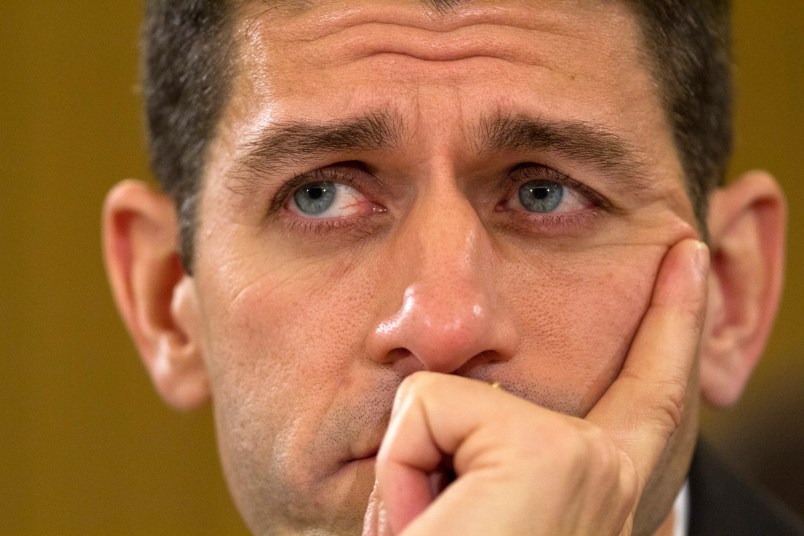The GOP’s policy visionary has found himself at odds with the conservative wing of his own party, which is testing his ability to finish up — and more importantly, achieve enough support to pass — a major bipartisan agreement for the first time in his career.
The Wisconsin congressman who chairs the Budget Committee is finalizing a multi-year budget agreement with his Senate counterpart, Democrat Patty Murray of Washington. After privately briefing Republican leaders on the talks, he hinted that a deal may be announced Tuesday evening. Even before the deal became official, conservatives began voicing their displeasure with the framework, which has been reported by TPM and other news outlets.
And it has Ryan in a triple-bind among the conservatives who have viewed him as a hero, GOP defense hawks and appropriators eager to return to normal budgeting and a possible desire to smooth his rough partisan edges if he ends up running for president in 2016.
Influential conservative groups who tend to have their way in the House are pushing Republicans to scuttle the negotiations. First, Heritage Action came out against the emerging agreement. Then Americans For Prosperity called on lawmakers to vote against it. Then FreedomWorks announced it’ll key-vote against the deal.
On Tuesday, 30 conservative House Republicans sent a letter calling on Speaker John Boehner (R-OH) to bring up legislation to continue funding the government at the $967 billion level called for under across-the-board sequestration cuts. While they didn’t mention the Ryan-Murray talks, the letter was an unmistakable rebuke to the emerging deal, which is expected to mitigate some of the sequester cuts and set spending at roughly $1 trillion.
“The Budget Control Act is the law of the land,” read the letter, which was organized by Reps. Mick Mulvaney (R-SC), Jim Jordan (R-OH) and Steve Scalise (R-LA). “Our Democrat colleagues are now threatening to shut the government down in order to change that. We should not permit that to happen. Again, we encourage you to bring a clean CR to the floor.”
These conservatives don’t want to spend a penny more than the sequester calls for, at least unless there are significant cuts to entitlement programs like Medicare and Social Security. The deal, according to sources familiar with the talks, would replace the sequester for two years with a mix of targeted spending cuts, flexibility for government agencies and non-tax revenues like higher federal worker contributions to pensions and higher airline ticket fees.
Meanwhile, several GOP tea party candidates for Congress are bashing the emerging deal — including Matt Bevin, who is challenging Senate Minority Leader Mitch McConnell of Kentucky, and Bryan Smith, who is challenging Rep. Mike Simpson of Idaho.
“Last night, Congressman Ryan returned to Washington. He is still working with Senator Murray to cut spending in a smarter way. They haven’t reached an agreement yet. We have nothing new to confirm at this time,” William Allison, a spokesman for Ryan, told TPM on Tuesday.
On the other hand, Ryan faces defense hawks who are deeply concerned that the sequester is slashing some important military programs and damaging national security. These Republicans have been clamoring to relieve those cuts and are hopeful a budget deal achieves that. Likewise, appropriators who actually have to flesh out spending bills believe the cuts are unsustainable. They’re also tired of funding the government in temporary stopgap measures and want to return to writing budgets under regular order.
Jack Pitney, a political science professor at Claremont McKenna College, observed that Ryan and conservatives haven’t always seen eye to eye. “The current criticism is not surprising. Any budget deal that could pass the Democratic Senate is bound to disappoint conservatives,” he said. “The problem with Congress is not just that Republicans and Democrats distrust each other. They even distrust themselves.”
The wild card in the negotiations has been Ryan’s rumored presidential ambitions for 2016. The mild-mannered Wisconsinite’s sterling conservative credentials, which he wants to protect, have come at a heavy price: they’ve badly damaged his standing outside the GOP base. Opponents have cited his tax-cutting, Medicare-privatizing budgets to paint him as callous and uncaring about the less fortunate. Ryan, the party’s vice presidential candidate in 2012, also has few tangible legislative accomplishments under his belt. Striking a budget deal after three years of crisis governance in Washington, which culminated in the shutdown earlier this fall, could help transform his image and boost his standing where he is weakest.
Democrats, meanwhile, have some concerns with the emerging budget framework but they aren’t likely to undercut Murray or scuttle an agreement. Senate Majority Whip Dick Durbin (D-IL) told TPM on Tuesday that there’s a “positive feeling” in the Democratic caucus about the framework. Murray’s spokesman Eli Zupnick said Tuesday the two budget chiefs continue to talk and that she is hopeful about shaking hands on a budget agreement soon.






